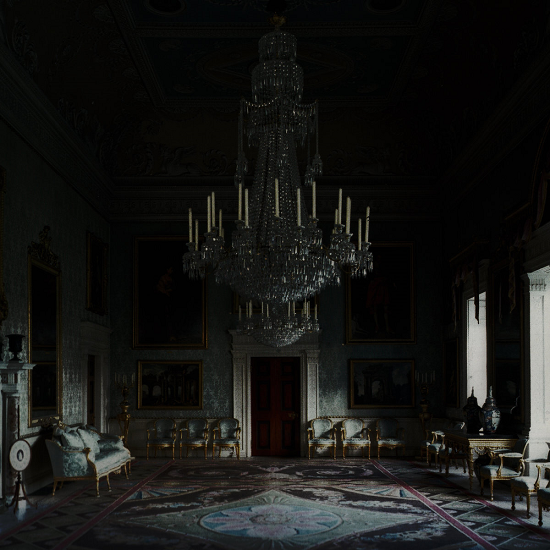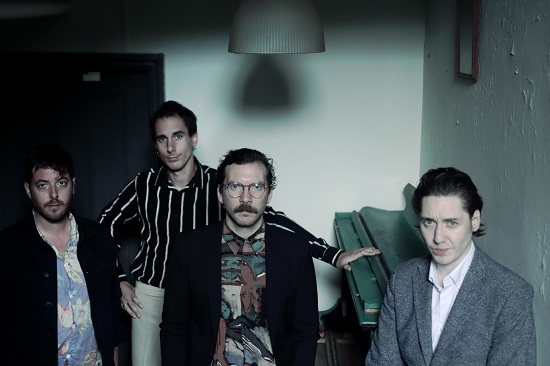Photo by Laura Spark
“This house has a character all of its own, we’re just passing through,” says Benjamin D Duvall, speaking via Zoom from the strange old building in Liverpool in which he lives. Built in 1884 as a lavish residence for Neil Mathieson, a Victorian chemical magnate, a decade or so after his death the building was purchased by The University Of Liverpool for the use of its Vice Chancellors (one of whom was the highly-regarded pathologist John George Adami). From 1941 until the mid-50s it was the Brazilian consulate; it’s believed that the cult Brazilian filmmaker Cavalcanti was once among those stationed there.
The musicians Duvall and Andrew PM Hunt, who record together as Land Trance, are two of the 15 people who currently live there, making their home among the relics of its former splendour. What was once a ballroom is now their lounge; the lady of the house’s chamber is now Duvall’s bedroom – complete with slanted shelves for her shoes. When their landlord first purchased the property, he came across a secret compartment filled with fascist propaganda and a gun. Had he fired it, the firearms disposal unit later told him, his arm would have been blown off. In their basement, they found a reel of film labelled ‘1968’, now waterlogged beyond restoration, and a Second World War-era gas mask.
“There’s a lot of history, and a lot of history we don’t know about,” Duvall continues of his surroundings. “The vibe of the place suggests a certain intrigue and opulence and faded glamour.” It’s an atmosphere they’re all too happy to lean into both as musicians and as residents. Before the pandemic, every now and then the housemates would hold low-key Sunday concerts in the old ballroom, “a donation entry, tell your mates type of thing,” Duvall recalls. “It was lovely, we’d put one or two acts on, all the music would be done by half seven, then everyone would pile down to the kitchen where I’d made a massive pan of curry.” One afternoon in late November 2018, their featured performer was Aging, the jazz project led by Manchester-based David McLean. McLean’s music, which draws on the potency of film noir and pulp detective soundtracks – smokey flowing melodies and enigmatic shuffling drums – felt like a good fit for a gloomy winter afternoon. “It just sounds like the thick red carpets, the panelling and the columns,” Duvall says.
McLean was no stranger; he’d for a time been part of Duvall’s avant-garde band Ex-Easter Island Head for a ‘Large Ensemble’ iteration, for instance. After the gig, he and Duvall – as well as Hunt who McLean was properly meeting for the first time – got speaking about a collaboration. They decided to bring drummer Joel Murray on board too. A past collaborator with both McLean and Duvall across a plethora of old projects, he and McLean had known each other from their time growing up in Milton Keynes, where the latter’s gig promoting older brother Don had spearheaded a febrile experimental music community by bringing some of the world’s most exciting avant-garde musicians to the kind of town that they might otherwise skip.
It was in March 2019 that the four began their first session in Hunt’s studio in the Embassy basement. An initial meet-up to test the waters exceeded all expectations. “It made us take it a lot more seriously,” says McLean, joining Duvall, Murray and I on the Zoom call. “It became more than just something interesting to do on a weekend, it was starting to sound really good. Every few weekends until the following September they’d meet up again. “We’d just go in and start experimenting,” he continues. “I’d do a take of piano, then we’d say ‘right, this piano sounds great, what can we put on top of it?’” In the time between their meetings, Duvall and Hunt would go back over the recordings, isolating the most promising points and sketching out what they might build on further. Every decision was democratic, adds Murray. “It felt completely comfortable. The fact we trust each other musically to make those decisions was the reason it worked so well.”
Strangely enough, Murray, McLean and Duvall had tried to collaborate together before in Manchester some years prior, but those sessions went nowhere. McLean puts it down to the rigidity of youth. “All of us would have been in our twenties then.” (They are all in their 30s now). “As a younger musician you’re a bit more in your own head, hanging on to preconceived ideas about what it is you do.” In the time since, says Duvall, “I’ve become more comfortable in myself, I know what the things are that I can bring to a session.”
By now both Land Trance and Aging have particularly strong musical identities. Aging takes on the ingrained traditions of pulp/noir jazz, and subtly plays with the rich atmospheres and stock identities they can conjure. Land Trance sees Hunt and Duvall combine the former’s gift for gorgeous, trancelike melody with the latter’s cornucopia of niche instrumentation, as well as a shared love of found sound and field recording, into something utterly spellbinding – “fragments of a potential narrative,” as Duvall puts it. Although it’s important that the record they were making wasn’t just a mash-up of those two styles, “It was never just ‘Aging meets Land Trance’,” says McLean. The fact they used those monikers at all was driven mainly by their desire to reach a larger audience. Nevertheless, says Duvall, “One thing me and Andy had in our minds at the start was that [Aging’s music] has got such a defined sound world, it operates within this ‘noir’ genre-framework. We were having discussions of ‘what if we put that heavily genred music through a Land Trance weirdo filter. Although the resulting sessions were a lot more nebulous and blurry than that.”
You can indeed hear both Land Trance and Aging on the record they ended up producing, the former’s hypnotic lattices of texture and the latter’s deep, resonant atmospheres. What you hear most, though, is the old building in which they worked. Named Embassy Nocturnes in tribute, the album’s eerie echoes are like reverberations from a dark and cavernous hallway, its hypnotic gloomy beauty like the dilapidated glamour of a forgotten ballroom, its distorted chimes like the tolling of a haunted grandfather clock. Listening to the album it is as if the building’s spirit itself has somehow been made audible; you can sense the presence of all those hidden histories and secret compartments around every corner, little fragments of something too big and too old to consume in one go.

That it is quite so aesthetically powerful is the product of that aforementioned maturity, the way in which the musicians knew when their leaving of space could be as impactful as their bringing of texture. “The most rewarding thing for me was not shoving as much as we possibly could into the record, but really letting things breathe,” says McLean. “Joel’s an exceptional drummer, but it never feels like he overplays, and when he is at his most technical it’s only in service of the way the song’s going.” Duvall’s cornucopic array of instruments – he plays a sampler, shahi baaja, bamboo marimba, zither, Dictaphone, and drum machine – are used sparingly for maximum impact. Though they explored an array of different sounds – Murray recalls “one session getting quite black metal” – they knew exactly what not to include, however interesting in isolation.
The employment of Nick Hunt on trumpet, double bassist Chris Hutchinson on double bass, and Ben Fair on keys and piano, was done with similar precision. They’d give a few suggestions as to the tone, let the musicians interpret it as they pleased – a desire for a sense of “tension” or “mournfulness” – then place their trust in both the guest’s skills and their restraint. “There was just such a lack of ego or showboating,” Duvall recalls fondly. “Everything was just in service of the song itself.” They recruited each musician pretty easily. Nick Hunt is Andrew’s brother; Hutchinson lives in the Embassy too and was a part of Hunt’s acclaimed art-rock band Outfit.
Their appearances hint at the fact that Embassy Nocturnes represents something wider than just ‘Aging meets Land Trance’. As well as its towering individual presence, the Embassy can also be viewed as a wider scene in microcosm, a temporary house for just one fragment of a nationwide experimental network. Those Sunday afternoon gigs its residents put on were a social event as much as they were musical. “I’d always end up meeting people, friends of friends,” says Duval. It is from these nexus points that the most wonderful left-field music grows, not just in the Embassy, but in bedrooms, warehouses and grotty upstairs rooms across the country. The Milton Keynes experimental music community in which McLean and Murray first crossed paths, and the fertile left-field Merseyside scene in which Duvall and Hunt cut their teeth, are just two different entries to the same destination, a destination from which Embassy Nocturnes is the most staggeringly powerful of transmissions.
Embassy Nocturnes by Land Trance and Aging is out now via Tombed Visions


